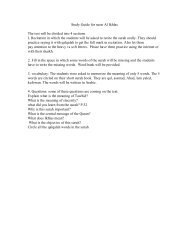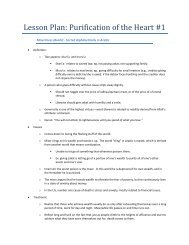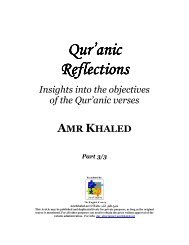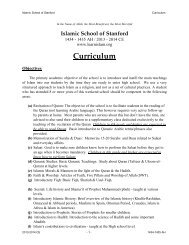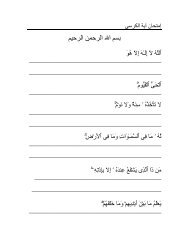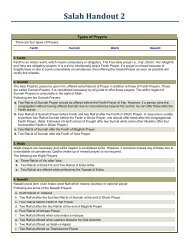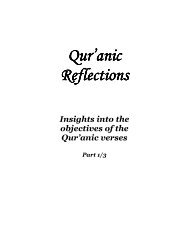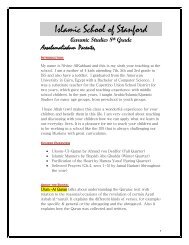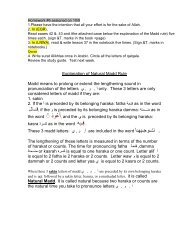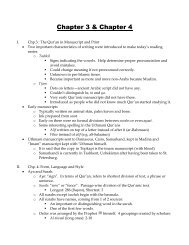Quranic Reflections - Islamic School of Stanford
Quranic Reflections - Islamic School of Stanford
Quranic Reflections - Islamic School of Stanford
Create successful ePaper yourself
Turn your PDF publications into a flip-book with our unique Google optimized e-Paper software.
3. “And do not (seek) support (you believers) for the ones who have done<br />
injustice, …”, (TMQ, 11: 113).<br />
Thus, if we take for example the story <strong>of</strong> Shu’ayb, keeping in mind the possibility <strong>of</strong><br />
applying those guidelines in all stories, we shall see the following:<br />
• The resoluteness <strong>of</strong> rectitude and betterment with balance. Allah says what<br />
can be translated as, “… Decidedly I would (do) nothing except<br />
reformation, (i.e., acting righteously) so far as I am able to …”, (TMQ,<br />
11: 88).<br />
• The unified message that all Allah’s messengers have called for (even in using<br />
the same words). Allah says what can be translated as, “And ask forgiveness<br />
<strong>of</strong> your Lord, thereafter repent to Him; …”, (TMQ, 11: 90).<br />
• The harsh circumstances and denial. Allah says what can be translated as,<br />
“They said, “O Shuaayb, in no way do we comprehend much <strong>of</strong> what you<br />
say; and surely we indeed see you weak among us. And had it not been for<br />
your clan, we would indeed have stoned you, …” (TMQ, 11:91).<br />
• The refraining from reckless replies. Allah says what can be translated as,<br />
“He said, “O my people, is my clan mightier against you than Allah …,”<br />
(TMQ 11:92).<br />
What is noticeable is that Shu’ayb used the same diction as Nuh (AS) in referring the<br />
matter to Allah; indeed, He shall be The One to hold them accountable. Allah says<br />
what can be translated as, “… Surely my Lord is Supremely Encompassing<br />
whatever you do,” (TMQ, 11:92).<br />
In parallel, the non-inclination <strong>of</strong> people is clearly present; Allah says what can be<br />
translated as, “… And be on the watch; (Literally: watch for yourselves) surely I<br />
will be with you, constantly watching,” (TMQ, 11:93).<br />
So forth, until this ayah (94) came with victory for the Prophet and the believers,<br />
Allah says what can be translated as, “And as soon as Our Command came, We<br />
safely delivered Shuaayb and the ones who believed with him by a mercy from<br />
Us …,”(TMQ, 11:94).<br />
Therefore, to all young people who cherish Islam and wish to serve and protect it,<br />
learn from this noble surah and from its numerous stories how to be poised when<br />
calling people to Islam in times <strong>of</strong> extreme trial and distress.<br />
Why was the Surah named Hud<br />
There remains one last question: Why was the surah named Hud, despite the fact that<br />
the story <strong>of</strong> Nuh (AS) is longer than that <strong>of</strong> Hud (AS) in this surah<br />
The answer is that the three axes <strong>of</strong> the surah (resoluteness, the absence <strong>of</strong> tyranny<br />
and recklessness, and familial leniency) have appeared in the story <strong>of</strong> Hud in a clear



